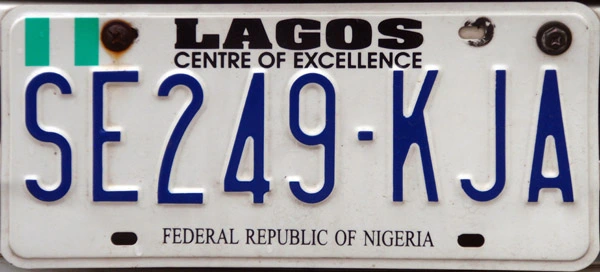How many types of plate number do we have and who oversees the issuance of plate numbers in Nigeria? Firstly, the Federal Road Safety Corps (FRSC) oversees vehicle registration and plate number issuance in Nigeria.
These plates are used to enforce traffic safety laws in addition to being a means of vehicle identification.
Nigeria has a very extensive license plate system with multiple types to suit different vehicle types and needs. But then, how many types of plate number do we have? Here’s a thorough look at the Nigerian license plate number options.
READ ALSO:
- How to Check Car Papers Online in Nigeria
- Steps to Renewal of Car Papers in Nigeria
- How Much to Renew Car Papers in Abuja?
- How Much to Renew Car Papers in Lagos in 2024?
- Fine for Expired Car Papers in Nigeria 2024
- How to Get Car Papers if Lost in Nigeria
How Many Types of Plate Number Do We Have in Nigeria?
Below are the types of plate numbers in Nigeria:
1. Private Vehicle Plate Numbers
In Nigeria, private vehicle license plates are the most prevalent kind. They are given to people for use in their cars.
These plates are easily recognized by their blue lettering on a white background. Typically, they have a combination of letters and numbers. The distinctive code for each state can be found either before or after the license plate number.
2. Commercial Vehicle Plate Numbers
This is one of the types of plate number in Nigeria. Commercial vehicles have unique license plates, such as cabs, buses, and haulage trucks.
These plates are clearly distinguished from private vehicle plates thanks to their black text on a yellow background. Differentiation facilitates national control and oversight of commercial transportation services.
3. Government Vehicle Plate Numbers
Government cars are identified by special license plates that reflect their official status. These license plates are exclusive to automobiles owned by national, state, and local governments.
They feature white text on a green background. This category also includes vehicles used by various government ministries, departments, and agencies.
4. Diplomatic Plate Numbers
This is one of the types of plate number in Nigeria and an important one for that matter. Diplomatic plate numbers are issued to vehicles owned by embassies, consulates, and international organizations.
These plates are identifiable by their unusual blue background with white text. Diplomatic plates grant benefits and immunities to vehicle owners under international law.
5. Military and Paramilitary Plate Numbers
Vehicles used by the Nigerian Army, Navy, Air Force, Police, and other security forces are classified as military or paramilitary and are assigned unique license plates.
These plates are frequently linked to particular security codes and usually include a distinctive letter and number combination. Depending on the military branch, these plates have different designs and colours.
6. Customized Plate Numbers
These license plate numbers are another option available to Nigerians. The combination of letters and numbers that vehicle owners choose to use on these plates frequently represents their tastes or the branding of their businesses.
Personalized plates are more expensive and still need to follow FRSC guidelines.
7. Temporary Plate Numbers
When a car is purchased but has not yet gotten permanent registration, temporary plate numbers are issued.
These numbers are often only valid for a few times and enable the owner to legally drive the vehicle while they wait for permanent plates to be granted. Temporary plates often have a different design to show their interim status.
8. Dealer Plate Numbers
This is one of the types of plate number in Nigeria. Vehicle dealers are allocated unique plate numbers for vehicles that are in transit or awaiting sale.
These license plates are necessary to test drive and move cars from one place to another without having to register them under a specific person’s name. Dealer plates stand out from other kinds of plates thanks to their unique design.
9. Articulated Vehicle Plate Numbers
Every articulated vehicle, including tankers and trailers, has a unique license plate number.
Large commercial vehicles have special identification requirements, and these plates meet those needs. They also frequently contain extra information to help with tracking and regulations.
In summary, Nigeria’s many plate number systems reflect the need to efficiently classify and control the wide variety of cars that it owns.
READ ALSO:
- What to Do if Car Papers are Lost
- Can a Car be Registered Twice in Nigeria?
- What are the Complete Vehicle Papers in Nigeria?
- What is the Cost of Change Ownership of a Car in Nigeria?
- How to Obtain New Proof of Ownership in Nigeria
- How to Check Registered Plate Numbers in Nigeria?
Every type of vehicle, including government, diplomatic, and military transports, private and commercial vehicles, has a distinct plate number system that facilitates regulation, identification, and law enforcement.
To ensure safe and effective transit across Nigeria’s roads, both law enforcement and vehicle owners must be aware of these distinctions.




